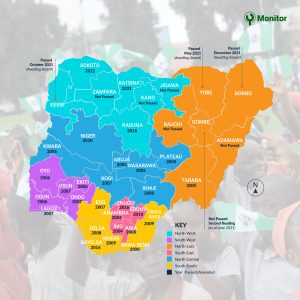The United Nations Convention on the Rights of the Child was in 1989, adopted by countries of the world, and a regional equivalent followed in 1990; in form of the African Charter on the Rights and Welfare of the Child. Since then, it has been a commonly held belief that the rights and fundamental freedoms of children are not debatable.
While Nigeria as a country and signatory to these covenants gave it legal consent by passing the Child Rights Act (CRA) in 2003; nine states in the country are yet to domesticate this all-important legislation.

NORTH WEST
NORTH EAST
NORTH CENTRAL
SOUTH WEST
SOUTH EAST
SOUTH SOUTH
Every democratic government at the national or sub-national level exist to protect the freedoms of its citizenry, which they must give account of, from time to time. Importantly, the protection of lives and properties (right to life) represent a cornerstone in this mandate and citizens cannot just rely on media promises in the quest for these anomaly to be done away with.
It’s also a no-brainer that the amount of attention given to the interest of children and their protection as a vulnerable population will go a long way in bringing negative developments in the society to a halt. Chief among these is their possible drift in the future into criminalities, especially if they become willing tools in the hands of mischief makers.